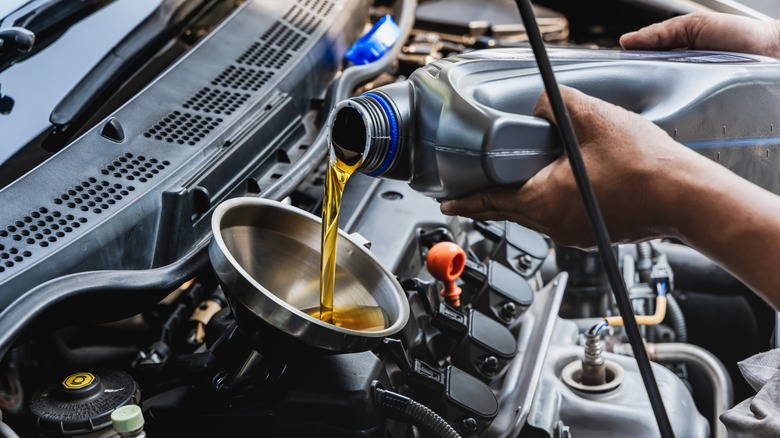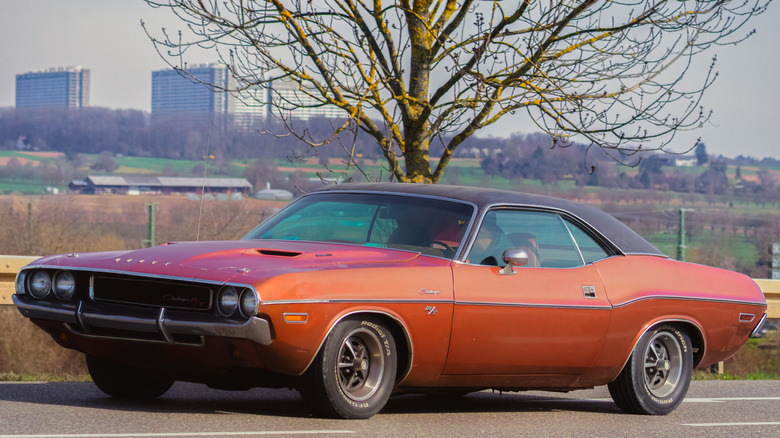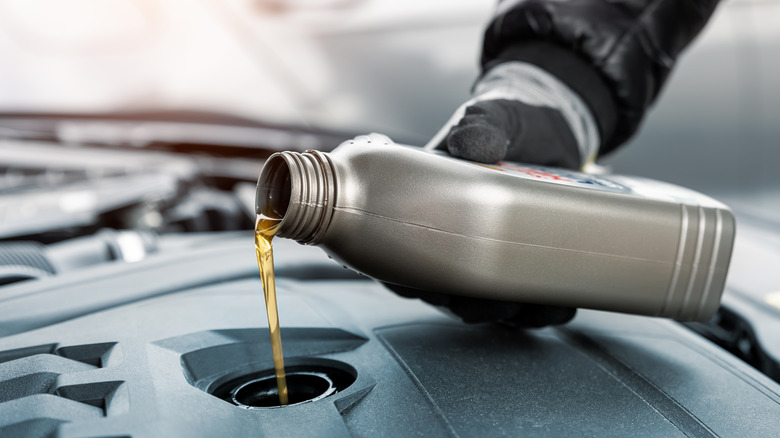Can You Use Synthetic Motor Oil In A Classic Car? (And Should You?)
Classic car owners are often quite devoted to their vehicles. Between the substantial investment (classic cars can be expensive to buy and maintain), sentimental value, and fun factor, most enthusiasts go to great lengths to keep their classic rides in top shape. Glass, interiors, and chrome are kept spotless, and DIY engine care helps keep them running. Changing your own oil is one of those important maintenance tasks that just about anyone can do.
But there are lots of different classifications for motor oil including conventional vs. synthetic oil, and what works best for a 2023 Dodge Challenger might not be the ideal choice for the 1970s version of that model. What's critically important is that you choose the right viscosity oil for your engine. If you don't have an owner's or factory service manual, you might be able to find one or an oil recommendation via an online forum dedicated to your classic. The conventional vs synthetic oil debate has as many opinions as there are classic car lovers, but here are the solid facts about using synthetic oil in a classic car.
Pros & cons of using synthetic oil in a classic car
Your choice of oil will depend on the engine's age and condition, your driving habits, and environmental conditions. Synthetic oils have some clear advantages over conventional oils. They have fewer impurities, protect the engine against sludge buildup, and allow for a longer interval between oil changes. For gearheads who use their classic cars as daily drivers, synthetic oil should help reduce engine wear during short trips. And since synthetic oil maintains a stable viscosity across different temperature extremes, it will protect the engine components in cold weather and when it's heated up from running hard. The practice of using synthetic oil in older cars developed a bad reputation in the waning years of the 20th century, when many owners reported synthetic oil leaks in their classics. The problem turned out to be an incompatibility between certain compounds in the oil and the rubber gaskets and seals in older engines.
Modern synthetic oils like Mobil 1 Advanced are made in a way that they work with older engines without leaking. While original classic car engines will run just fine on conventional oil, you'll have to account for any upgrades or modernizations that have been done to the car. If you've done an LS engine swap, you'll likely need to use a full synthetic oil. This will protect your new engine from wear and optimize performance and fuel mileage thanks to reduced internal friction. Modern synthetic oils don't break down as easily as conventional oils — even under stress — and they evaporate at a much slower rate. This means fewer contaminants mucking up your engine and reduced oil consumption for many drivers.
Risks of using synthetic motor oil in a classic car
Even though motor oil companies have ironed out the issues with ester compounds that caused leaks in older engines, you can still do damage to your classic car by using synthetic oil. Engines with flat-tappet camshafts used to be the norm, but roller cams are now preferred because they wear less dramatically. Older motor oils had zinc additives to protect the flat-tappet cams, but the metallic element has been phased out because it can wreck the emissions control devices in modern cars.
Most modern synthetic oils have little or no zinc content because of the damage it can cause to expensive catalytic converters. If you want to use a modern synthetic oil in your flat-tappet classic car engine, a product like Rizlone Hy-per Lube ZDDP oil additive can help protect the valvetrain. But provided you change your oil and filter regularly and still have the original engine in place, using conventional oil or a synthetic blend in your classic car should be just fine.


